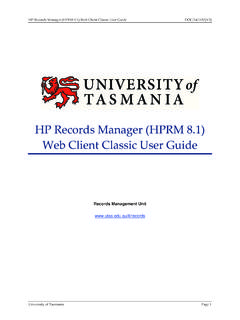Transcription of SCHOOL LEADERS: CHALLENGING ROLES AND IMPACT ON ... …
1 OECD COMMISSIONED PAPER SCHOOL LEADERS: CHALLENGING ROLES AND IMPACT ON TEACHER AND SCHOOL EFFECTIVENESS Bill Mulford Professor and Director Leadership for Learning Research Group Faculty of Education University of Tasmania April 2003 1 CONTENT Page I. OVERVIEW 2 II. BACKGROUND PAPER 5 1. Introduction: Schools are seen as increasingly important 5 2. Approaches to SCHOOL governance and the changing role of SCHOOL leaders 6 Introduction 6 Old Public Administration 6 New Public Management 8 Organisational Learning 11 Inconsistent demands 13 Summary 14 3.
2 Ways in which SCHOOL leaders strengthen teacher recruitment, development and retention 16 Introduction 16 Leadership and teacher satisfaction 17 Leadership and teacher role/performance 17
3 Teacher leadership 18 The relationship between role and distributive leadership and organisational learning 19 Development - Turning research into policy and practice 21 4. Ways in which SCHOOL leaders lift student outcomes 24 The leadership for organisational learning and student outcomes study 24 Other recent research on ways in which leaders lift student outcomes 26 5.
4 Recruitment of SCHOOL leaders 29 Introduction 29 Is there a shortage of SCHOOL leaders? 30 Reasons for the shortage of SCHOOL leaders 30 Summary 33 A warning 34 6.
5 Professional development of SCHOOL leaders 35 Introduction: A proposed model of the stages and dimensions in the provision of SCHOOL leader professional development 35 Illustrating aspects of the proposed model of the stages and dimensions in the provision of SCHOOL leader professional development 36 Some recent cross-country research findings on the professional development of SCHOOL
6 Leaders 42 III. SOME IMPLICATIONS 45 1. Achieving the heightened expectations of schools 45 2. Ways in which SCHOOL leaders can strengthen teacher recruitment, development and retention 46 3. Ways in which SCHOOL leaders lift student outcomes 46 4.
7 Recruitment of SCHOOL leaders 46 5. Retention - Professional development of SCHOOL leaders 47 IV. REFERENCES 49 V. APPENDICES 55 Appendix 1: Leithwood et al (2002) Analysis of Standards 56 Appendix 2: Huber & West (2002) Overview of SCHOOL Leadership Development in Ten Countries 59 2 I. OVERVIEW This paper suggests that ongoing developments in societies and their provision of education are reflected in the ROLES , recruitment and development of SCHOOL leaders.
8 The paper first examines how, as a result of these developments, the role of SCHOOL leaders is changing. It then examines if SCHOOL leaders can strengthen the recruitment, development and retention of teachers, as well as lift student outcomes. Evidence is provided to demonstrate that particular leadership practices can achieve these outcomes. It is concluded that SCHOOL leaders remain of crucial importance for continued improvement of education. Given this importance, the paper then focuses on SCHOOL leader recruitment and development and retention (or professional development). A number of implications of these various explorations conclude the paper.
9 The major approaches employed by governments to ensure ongoing educational reforms were identified as old public administration (OPA), new public management (NPM) and organisational learning (OL). Inconsistencies within and between these approaches were shown create their own pressures on schools and their leaders. The worry is that the cumulative demands and resulting fragmentation and incoherence could undermine the capacity of schools. When considered en masse rather than separately, these myriad views may create unintended consequences that fuel the current problems of supply and quality in the principalship. The result is a largely unattainable ideal of mythological proportions - the superprincipal.
10 While it is argued that NPM has emerged as the dominant approach in educational governance, recent research questions its effectiveness in terms of improved student outcomes. It is suggested that a closer examination be made of OL. In order to meet the heightened, multiple expectations now placed on schools, as well as to have engaged teachers, it is argued that schools need to become learning organisations, consciously and continuously pursuing quality improvement. Within schools that are learning organisations evolve new types of relationship between students, teachers and leaders based around a reasonably common set of characteristics that include a trusting and collaborative climate, a shared and monitored mission, taking initiatives and risks, and ongoing, relevant professional development.














